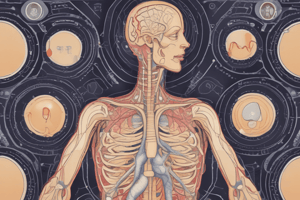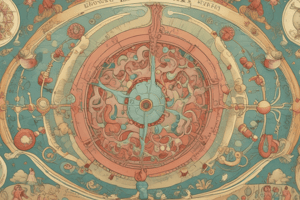Podcast
Questions and Answers
What distinguishes endocrine glands from other glands in the body?
What distinguishes endocrine glands from other glands in the body?
- Endocrine glands have complex duct systems.
- Endocrine glands are primarily responsible for digestive functions.
- Endocrine glands secrete hormones directly into the bloodstream. (correct)
- Endocrine glands produce enzymes for metabolic reactions.
How do hormones function in the human body?
How do hormones function in the human body?
- Hormones provide point-to-point direct communication between cells.
- Hormones serve as intercellular messengers that coordinate physiological functions. (correct)
- Hormones act as immediate energy sources for cellular functions.
- Hormones only influence organs directly connected to them.
Which statement about the definition of hormones is accurate?
Which statement about the definition of hormones is accurate?
- Hormones are large protein molecules required in significant quantities.
- Hormones are produced in trace amounts and function as chemical messengers. (correct)
- Hormones can only originate from specialized endocrine organs.
- Hormones are primarily nutrients essential for cell survival.
What is a key characteristic of the hormonal coordination system compared to the neural system?
What is a key characteristic of the hormonal coordination system compared to the neural system?
Which statement correctly describes the complexity of endocrine systems in different organisms?
Which statement correctly describes the complexity of endocrine systems in different organisms?
Which endocrine gland is responsible for regulating various body functions and contains neurosecretory cells?
Which endocrine gland is responsible for regulating various body functions and contains neurosecretory cells?
Which of the following glands directly produce hormones that influence metabolism?
Which of the following glands directly produce hormones that influence metabolism?
What is the main function of the adrenal glands within the endocrine system?
What is the main function of the adrenal glands within the endocrine system?
Which of these is considered a gonad in the endocrine system?
Which of these is considered a gonad in the endocrine system?
Which hormone-producing organ is primarily associated with the regulation of circadian rhythms?
Which hormone-producing organ is primarily associated with the regulation of circadian rhythms?
Which gland is located in the forebrain and regulates hormonal secretion from the pituitary gland?
Which gland is located in the forebrain and regulates hormonal secretion from the pituitary gland?
What type of glands are the thyroid and parathyroid classified as?
What type of glands are the thyroid and parathyroid classified as?
What is the primary role of insulin in glucose metabolism?
What is the primary role of insulin in glucose metabolism?
Which of the following best describes the consequence of prolonged hyperglycemia?
Which of the following best describes the consequence of prolonged hyperglycemia?
What is one dual function of the testis?
What is one dual function of the testis?
How does glucagon affect blood glucose levels?
How does glucagon affect blood glucose levels?
What is the role of androgens in male development?
What is the role of androgens in male development?
What effect do androgens have on protein metabolism?
What effect do androgens have on protein metabolism?
In which cells does insulin mainly exert its effects?
In which cells does insulin mainly exert its effects?
Which hormone is primarily responsible for stimulating gluconeogenesis?
Which hormone is primarily responsible for stimulating gluconeogenesis?
What is a significant characteristic of ketone bodies in diabetic patients?
What is a significant characteristic of ketone bodies in diabetic patients?
What condition is characterized by an enlargement of the thyroid gland due to iodine deficiency?
What condition is characterized by an enlargement of the thyroid gland due to iodine deficiency?
Which hormone is secreted by the parathyroid glands and is responsible for increasing calcium levels in the blood?
Which hormone is secreted by the parathyroid glands and is responsible for increasing calcium levels in the blood?
What is the main consequence of hypothyroidism during pregnancy?
What is the main consequence of hypothyroidism during pregnancy?
Which condition is indicated by protrusion of the eyeballs and increased basal metabolic rate?
Which condition is indicated by protrusion of the eyeballs and increased basal metabolic rate?
What role do thyroid hormones play in the body?
What role do thyroid hormones play in the body?
Which vitamin deficiency could lead to impaired thyroid function?
Which vitamin deficiency could lead to impaired thyroid function?
How does parathyroid hormone affect renal function?
How does parathyroid hormone affect renal function?
What is a common symptom of hypothyroidism in adult women?
What is a common symptom of hypothyroidism in adult women?
Which hormone is responsible for regulating blood calcium levels by decreasing it?
Which hormone is responsible for regulating blood calcium levels by decreasing it?
Flashcards
Endocrine glands
Endocrine glands
Ductless glands that release hormones directly into the bloodstream.
Hormones
Hormones
Non-nutrient chemicals acting as intercellular messengers, produced in trace amounts.
Endocrine system
Endocrine system
System that coordinates and regulates physiological functions alongside the nervous system.
Hormone action
Hormone action
Signup and view all the flashcards
Ductless glands
Ductless glands
Signup and view all the flashcards
Hypothalamus
Hypothalamus
Signup and view all the flashcards
Neurosecretory cells
Neurosecretory cells
Signup and view all the flashcards
What are the endocrine glands?
What are the endocrine glands?
Signup and view all the flashcards
What are some additional hormone-producing tissues?
What are some additional hormone-producing tissues?
Signup and view all the flashcards
What is the function of the endocrine system?
What is the function of the endocrine system?
Signup and view all the flashcards
What are hormones?
What are hormones?
Signup and view all the flashcards
How do hormones work?
How do hormones work?
Signup and view all the flashcards
Iodine's Role in Thyroid
Iodine's Role in Thyroid
Signup and view all the flashcards
Hypothyroidism
Hypothyroidism
Signup and view all the flashcards
Goiter
Goiter
Signup and view all the flashcards
Cretinism
Cretinism
Signup and view all the flashcards
Hyperthyroidism
Hyperthyroidism
Signup and view all the flashcards
Exophthalmic Goiter
Exophthalmic Goiter
Signup and view all the flashcards
Thyroid Hormones' Functions
Thyroid Hormones' Functions
Signup and view all the flashcards
Parathyroid Gland Location
Parathyroid Gland Location
Signup and view all the flashcards
Parathyroid Hormone (PTH)
Parathyroid Hormone (PTH)
Signup and view all the flashcards
Glucagon's effect on glucose
Glucagon's effect on glucose
Signup and view all the flashcards
Insulin's role
Insulin's role
Signup and view all the flashcards
What is diabetes mellitus?
What is diabetes mellitus?
Signup and view all the flashcards
Testis: Primary sex organ?
Testis: Primary sex organ?
Signup and view all the flashcards
Testis: Endocrine gland?
Testis: Endocrine gland?
Signup and view all the flashcards
Androgen's effect on males
Androgen's effect on males
Signup and view all the flashcards
Androgen's role in spermatogenesis
Androgen's role in spermatogenesis
Signup and view all the flashcards
Ovary location
Ovary location
Signup and view all the flashcards
Study Notes
Chemical Coordination and Integration
- The neural system provides rapid, point-to-point coordination
- Neural coordination is fast but short-lived
- Endocrine system provides continuous coordination through hormones
- Hormones are non-nutrient chemicals acting as intercellular messengers
- Hormones are secreted in trace amounts
- Endocrine glands are ductless glands
- Invertebrates have simple endocrine systems
- Vertebrates have complex endocrine systems
Endocrine Glands and Hormones
- Endocrine glands secrete hormones directly into the blood
- Hormones are transported to target organs
- Classical definition of hormone: a chemical produced by endocrine glands, released into the blood, and transported to a distant target organ.
- Updated definition: non-nutrient chemicals, acting as intercellular messengers, produced in trace amounts
Human Endocrine System
- The human endocrine system includes various glands and hormone-producing tissues
- Pituitary, pineal, thyroid, adrenal, pancreas, parathyroid, thymus, and gonads are the organized endocrine glands and these coordinate with other organs (heart, kidney, gastrointestinal tract)
- Hypothalamus regulates body functions and controls pituitary
The Hypothalamus
- The hypothalamus is the basal part of the forebrain
- It regulates various body functions
- Hypothalamus produces hormones that either stimulate or inhibit pituitary hormone secretion
The Pituitary Gland
- The pituitary gland is located in a bony cavity (sella turcica)
- It is attached to the hypothalamus by a stalk
- The pituitary has two parts: anterior pituitary (adenohypophysis) and posterior pituitary (neurohypophysis)
- Anterior pituitary produces growth hormone (GH), prolactin (PRL), thyroid stimulating hormone (TSH), adrenocorticotrophic hormone (ACTH), luteinizing hormone (LH), and follicle-stimulating hormone (FSH)
- Posterior pituitary stores and releases oxytocin and vasopressin, which are produced by the hypothalamus
The Pineal Gland
- Located on the dorsal side of the forebrain
- Secretes melatonin, which regulates the 24-hour rhythm
- Influences sleep-wake cycles, body temperature, pigmentation and menstrual cycle
Thyroid Gland
- Located on either side of the trachea
- Composed of follicles and stromal tissues
- Secretes tetraiodothyronine (T4) and triiodothyronine (T3)
- Iodine is essential for hormone synthesis
- Deficiency in iodine leads to goiter
- Hypothyroidism during pregnancy can lead to cretinism
Parathyroid Gland
- Located on the back side of the thyroid gland
- Secretes parathyroid hormone (PTH)
- Regulates blood calcium levels
Thymus Gland
- Located between the lungs
- Secretes thymosins, which are essential for the immune system development
Adrenal Gland
- Located on the anterior part of each kidney
- Composed of adrenal medulla and adrenal cortex
- Adrenal medulla secretes adrenaline (epinephrine) and noradrenaline (norepinephrine)
- Adrenal cortex secretes glucocorticoids and mineralocorticoids
Pancreas
- A composite gland: exocrine and endocrine
- Endocrine part consists of islets of Langerhans
- Alpha cells secrete glucagon (hyperglycemic hormone)
- Beta cells secrete insulin (hypoglycemic hormone)
Testes
- Located in the scrotum
- Produce androgens, mainly testosterone
- Androgens regulate male sexual characteristics and spermatogenesis
Ovaries
- Located in the abdomen
- Produce estrogen and progesterone
- Estrogen and progesterone regulate female sexual characteristics and reproductive functions
Hormones of Heart, Kidney, and Gastrointestinal Tract
- Heart secretes atrial natriuretic factor (ANF). ANF decreases blood pressure
- Kidneys secrete erythropoietin which stimulates red blood cell production
- Gastrointestinal tract secretes gastrin, secretin, cholecystokinin (CCK), and gastric inhibitory peptide (GIP).
Mechanism of Hormone Action
- Hormones bind to specific receptors in target tissues
- Binding initiates a series of biochemical changes in the target tissue
- The effects of hormones depend on their chemical nature
- Different types of receptors are membrane-bound and intracellular
Summary
- Chemical coordination is essential for the body's physiological functions
- Hormones regulate numerous bodily processes
Studying That Suits You
Use AI to generate personalized quizzes and flashcards to suit your learning preferences.




